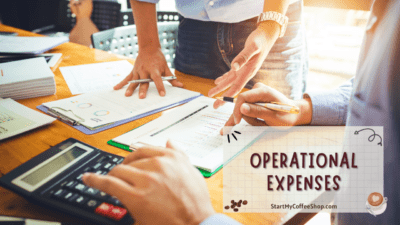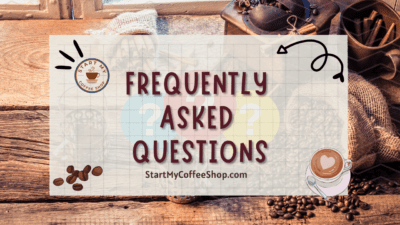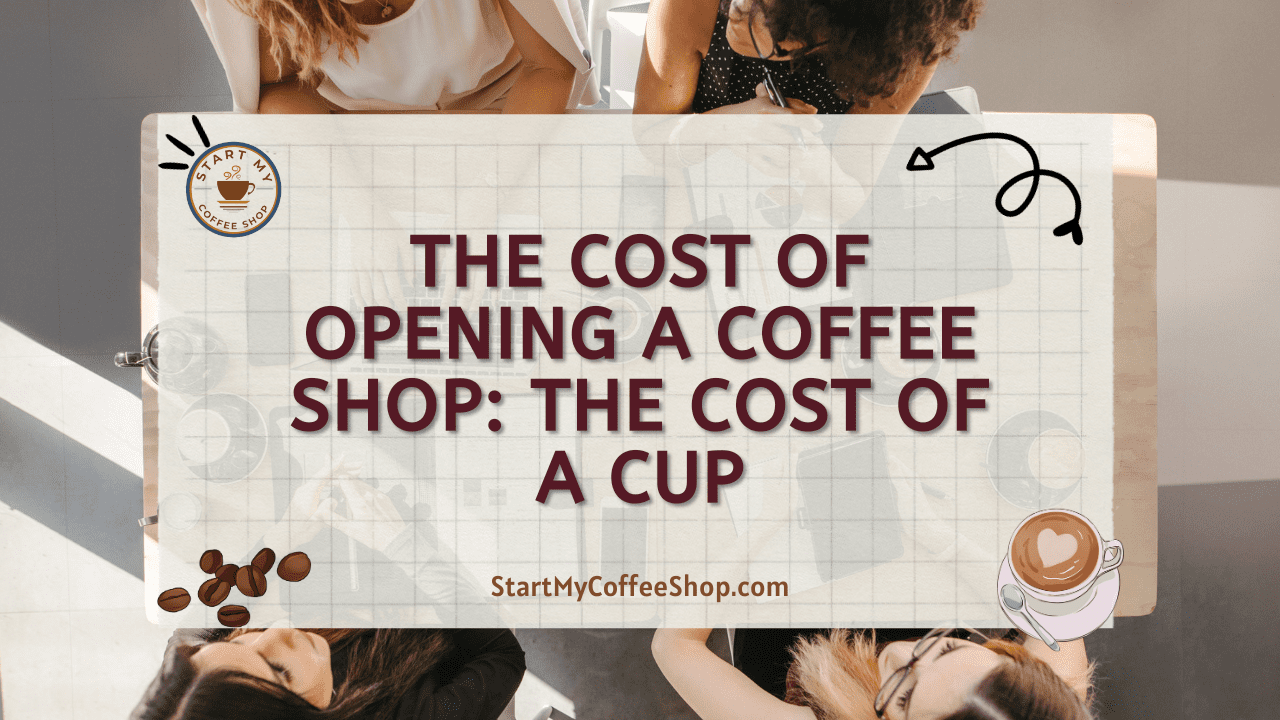Opening a coffee shop can be an exciting venture, filled with the aroma of freshly brewed coffee and the promise of a thriving community hub. However, before embarking on this journey, it’s crucial to understand the costs involved.
Opening a coffee shop entails various costs, including location expenses, equipment and furnishings, licenses, staffing, inventory, marketing, operational costs, and a contingency fund. Proper financial planning and budgeting are essential for a great venture.
In this article, I will explore the various expenses associated with opening a coffee shop and provide you with a comprehensive analysis to help you make informed decisions.
Location

The location of a coffee shop plays a pivotal role in determining its progress and financial viability. Choosing a prime location with high foot traffic can greatly impact your initial investment. When considering a location, it is crucial to factor in various costs such as rent, utilities, and property taxes.
Rent tends to be one of the largest expenses for a coffee shop, and prices can vary depending on the area and demand. It’s important to strike a balance between affordability and the potential for attracting a steady stream of customers. Additionally, utilities such as electricity, water, and internet services should be factored into your budget.
Property taxes are another aspect to consider when evaluating the cost of the location. They can vary based on the jurisdiction and the assessed value of the property. Researching and understanding the local tax regulations will help you estimate this expense accurately.
Moreover, conducting thorough market research is essential. Analyze the local market to gain insights into the competition and understand the potential customer base. Identifying areas with a high demand for specialty coffee and areas with untapped potential can guide your decision-making process.
Careful consideration of rent, utilities, property taxes, and market dynamics will help you make an informed decision and allocate your budget effectively.
Read more about: SWOT Analysis Coffee Shop Business Plan: A Taste of Strategy
Equipment and Furnishings
The expenses associated with acquiring essential equipment can accumulate rapidly. From espresso machines to coffee grinders and refrigeration units, each plays a vital role in the smooth operation and production of high-quality coffee. While prices may vary depending on features and brands, it is important to prioritize durability, efficiency, and performance when selecting equipment.
In addition to equipment, creating a comfortable and visually appealing atmosphere is crucial to attracting and retaining customers. Investing in appealing furniture, including tables and chairs, contributes to the overall ambiance of the space.
Careful consideration should be given to the materials, comfort, and durability of the furnishings, ensuring they align with the coffee shop’s theme or desired aesthetic.
Furthermore, incorporating suitable decor adds an extra touch of personality and charm to the space. Whether it’s artwork, plants, or decorative elements, these details help create a unique and inviting environment that resonates with customers. The decor should be in harmony with the coffee shop’s branding and contribute to the overall customer experience.
While the costs of equipment and furnishings can be significant, they are investments that contribute to the longevity of the coffee shop.
By carefully selecting equipment for efficiency and durability, and investing in appealing furnishings and decor, you create an environment that not only attracts customers but also keeps them coming back for the exceptional experience you provide.
Licenses and Permits
Compliance with local regulations is a crucial aspect of opening a coffee shop. It is essential to obtain the necessary licenses and permits to ensure that your business operates within the legal framework. These requirements typically include health permits, food handling certifications, and business permits, among others. Each of these permits comes with associated fees that should be accounted for in your budget.
Health permits are necessary to demonstrate that your coffee shop meets specific health and sanitation standards. These permits ensure that your establishment maintains a clean and safe environment for both staff and customers. The fees for health permits vary depending on the jurisdiction and the size of your coffee shop.
Food handling certifications are vital, as they verify that your staff is trained in proper food safety practices. These certifications are often obtained through training programs or courses and may require renewal at certain intervals. Consider the costs of training programs or certifications when budgeting for your coffee shop.
Business permits are required to legally operate your coffee shop. These permits cover aspects such as zoning, occupancy, and compliance with local business regulations. The fees associated with business permits can vary depending on the location and the specific requirements set by the local authorities.
Staffing and Training

Careful consideration should be given to the number of staff members required to operate efficiently during various shifts. Take into account the tasks and responsibilities involved in running your coffee shop, such as taking orders, brewing coffee, preparing food, and providing customer service.
When budgeting for staffing costs, it is essential to factor in wages, benefits, and potential training expenses. Fair wages attract and retain talented employees who will contribute to exceptional customer service. Consider the local labor market and industry standards to determine competitive wages for your staff.
Benefits such as health insurance paid time off, and retirement plans are important incentives that can help attract and retain quality employees. Research and budget accordingly to offer a competitive benefits package that aligns with your coffee shop’s financial capabilities.
Investing in training programs for your staff is crucial to ensure consistency and quality in customer service. Training costs can include both initial trainings for new hires and ongoing training to enhance skills and knowledge. Incorporate these expenses into your budget to prioritize staff development and maintain a high level of service.
Read more about: Strategic Business Plan for Coffee Shop: A Caffeinated Strategy
Inventory and Supplies
Coffee beans, syrups, milk, pastries, and other supplies form a crucial part of the ongoing expenses for your coffee shop. To effectively manage these costs, it is important to estimate the quantities needed, conduct thorough research to find reliable suppliers, and negotiate favorable terms that optimize your expenses.
Estimating the quantities of supplies required is essential to avoid wastage and ensure you have a consistent supply for your customers. Consider factors such as daily demand, seasonal variations, and popular menu items to determine appropriate quantities. By closely monitoring sales patterns and adjusting your inventory accordingly, you can strike a balance between meeting customer demand and minimizing waste.
Researching and identifying reliable suppliers is another vital step. Look for suppliers who offer competitive pricing, quality products, and reliable delivery schedules. Establishing strong relationships with your suppliers can lead to favorable terms, such as bulk discounts or extended payment terms, helping you optimize your costs in the long run.
Negotiating favorable terms with suppliers is an important aspect of cost management. Leverage your purchasing power, particularly when ordering high quantities, to secure the best possible prices. Explore opportunities for long-term contracts or partnerships with suppliers to potentially secure more advantageous pricing and terms.
Proper inventory management is crucial to avoid overstocking or running out of essential items. Implement inventory tracking systems and regular stock checks to ensure you maintain an optimal level of inventory. This helps minimize waste, reduce carrying costs, and ensure a consistent supply for your customers.
Marketing and Branding
Promoting your coffee shop is crucial for attracting customers and building a strong customer base. To effectively market your business, it is essential to allocate a budget for various marketing efforts. This includes investments in signage, advertising, establishing an online presence, and running social media campaigns.
Signage plays a significant role in catching the attention of passersby and informing them about your coffee shop. Design and production costs for eye-catching signage should be considered when creating your marketing budget. A well-designed and strategically placed sign can attract potential customers and generate curiosity about your offerings.
Advertising is another avenue to explore when promoting your coffee shop. This can involve traditional methods such as print ads, radio spots, or local event sponsorships. Additionally, investing in digital advertising, including pay-per-click (PPC) campaigns or social media ads, can effectively reach a broader audience and drive online traffic to your business.
Establishing a strong online presence is crucial in today’s digital age. This includes creating a user-friendly website that showcases your menu, location, and contact information. Investing in search engine optimization (SEO) can help improve your online visibility and drive organic traffic to your website.
Utilizing social media platforms is an effective and cost-efficient way to engage with potential customers and build a loyal following. Allocate resources for social media campaigns that promote your coffee shop, share engaging content, and encourage user-generated content to enhance brand awareness and customer engagement.
To create a memorable and recognizable brand identity, consider the costs of designing a visually appealing logo, menus, and other branding materials. Professional graphic designers can help create a cohesive and appealing brand image that aligns with your coffee shop’s unique personality and resonates with your target audience.
Operational Expenses

Insurance is another important consideration to protect your business against unforeseen circumstances. This may include general liability insurance, property insurance, and workers’ compensation insurance, among others. The premiums for these policies will depend on factors such as the size of your coffee shop, location, and coverage limits.
Maintenance and repairs are inevitable costs associated with running a coffee shop. Regular upkeep of equipment, plumbing, and facilities is crucial to ensure smooth operations and a pleasant customer experience. Budgeting for these expenses will help you address any necessary repairs or replacements promptly.
Waste disposal is an ongoing expense that should not be overlooked. Proper waste management is essential for maintaining cleanliness and complying with environmental regulations. Consider the costs of waste removal services or waste management systems to ensure efficient and responsible waste disposal.
Ongoing marketing efforts are vital for the continued growth of your coffee shop. Allocating a portion of your budget for marketing activities, such as promotions, advertising, and social media campaigns, helps attract new customers and retain existing ones.
Read more about: Startup Costs for a Coffee Shop: The Financial Aroma
Contingency Fund
It’s important to anticipate and prepare for unforeseen circumstances that may arise while running a coffee shop. These can include equipment breakdowns, unexpected repairs, or slower-than-expected business growth.
To ensure you can handle such situations without compromising the quality of your service or jeopardizing your financial stability, it’s wise to set aside a contingency fund.
A contingency fund serves as a safety net, providing you with the financial resources to address unexpected expenses. By allocating a portion of your budget to this fund, you can handle emergencies or unforeseen costs that may arise.
This could include repairing or replacing a malfunctioning espresso machine, addressing unforeseen structural issues, or investing in additional marketing efforts to boost business growth.
Having a contingency fund not only provides financial security but also offers peace of mind. It allows you to navigate challenging circumstances without sacrificing the quality of your coffee or compromising the overall experience for your customers.
Summary
Opening a coffee shop involves various costs that must be carefully considered and accounted for in your business plan. Understanding the expenses associated with location, equipment, licenses, staffing, inventory, marketing, operational costs, and having a contingency fund will help you navigate the financial aspects of your coffee shop venture.
Frequently Asked Questions

How much does it cost to lease a suitable location for a coffee shop?
Rental prices can range from moderate to high, so thorough research and negotiation are important.
What equipment is necessary for a coffee shop, and how much does it cost?
Essential equipment for a coffee shop includes espresso machines, coffee grinders, refrigeration units, and more.
Are there any specific permits or licenses required to open a coffee shop?
Yes, opening a coffee shop typically requires permits and licenses, such as health permits, food handling certifications, and business licenses.
To learn more on how to start your own coffee shop, check out my startup documents here.
Disclaimer: The information provided by StartMyCoffeeShop.com (“The Site”) is for general informational purposes only. All information on the Site is provided in good faith. However, we make no representation or warranty of any kind, express or implied, regarding the accuracy, adequacy, validity, reliability, availability, or completeness of any information on the Site. Under no circumstance shall we have any liability to you for any loss or damage of any kind incurred as a result of the use of the Site or Reliance on any information provided on the Site. Your use of the Site and reliance on any information on the Site is solely at your own risk. This blog post is for educational purposes only and does not constitute legal advice. Please consult a legal expert to address your specific needs. Terms and Conditions. (https://startmycoffeeshop.com/terms-and-conditions/)

Hi! I’m Shawn Chun
My adventure in coffee began when I first launched my first coffee shop back in the early 2000s. I had to figure out so many things on my own and to make it worse within 2 years of opening two large corporate coffee chains moved in just blocks away from me!
As I saw smaller and even some larger coffee shops in the neighborhood slowly lose customers to these giant coffee chains and slowly close up shop, I knew that I had to start getting creative…or go out of business.
I (like you may be) knew the coffee industry well. I could make the best latte art around and the foam on my caps was the fluffiest you have ever seen. I even had the best state-of-the-art 2 group digital Nuova Simonelli machine money could buy. But I knew that these things alone would not be enough to lure customers away from the name brand established coffee shops.
Eventually, through lots of trial and error as well as perseverance and creativity I did find a way to not only survive but also thrive in the coffee/espresso industry even while those corporate coffee chains stayed put. During those years I learned to adapt and always faced new challenges. It was not always easy, however, in the end, I was the sole survivor independent coffee shop within a 10-mile radius of my location. Just two corporate coffee chains and I were left after that year. All told the corporate coffee chains took down over 15 small independent coffee shops and kiosks and I was the last one standing and thriving.
Along the years I meet others with the same passion for coffee and I quickly learned that it is not only “how good a barista is” that makes a coffee shop successful, but the business side of coffee as well.
Hence why I started this website you are on now. To provide the tools and resources for up and coming coffee shop owners to gain that vital insight and knowledge on how to start a coffee shop successfully.
Stick around, browse through my helpful blog and resources and enjoy your stay! With lots of LATTE LOVE!
Shawn







